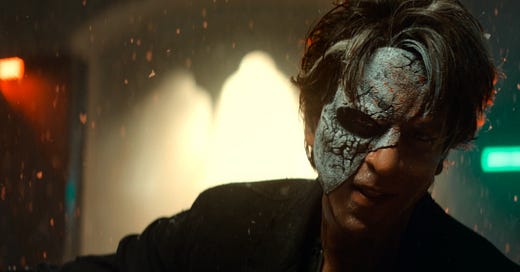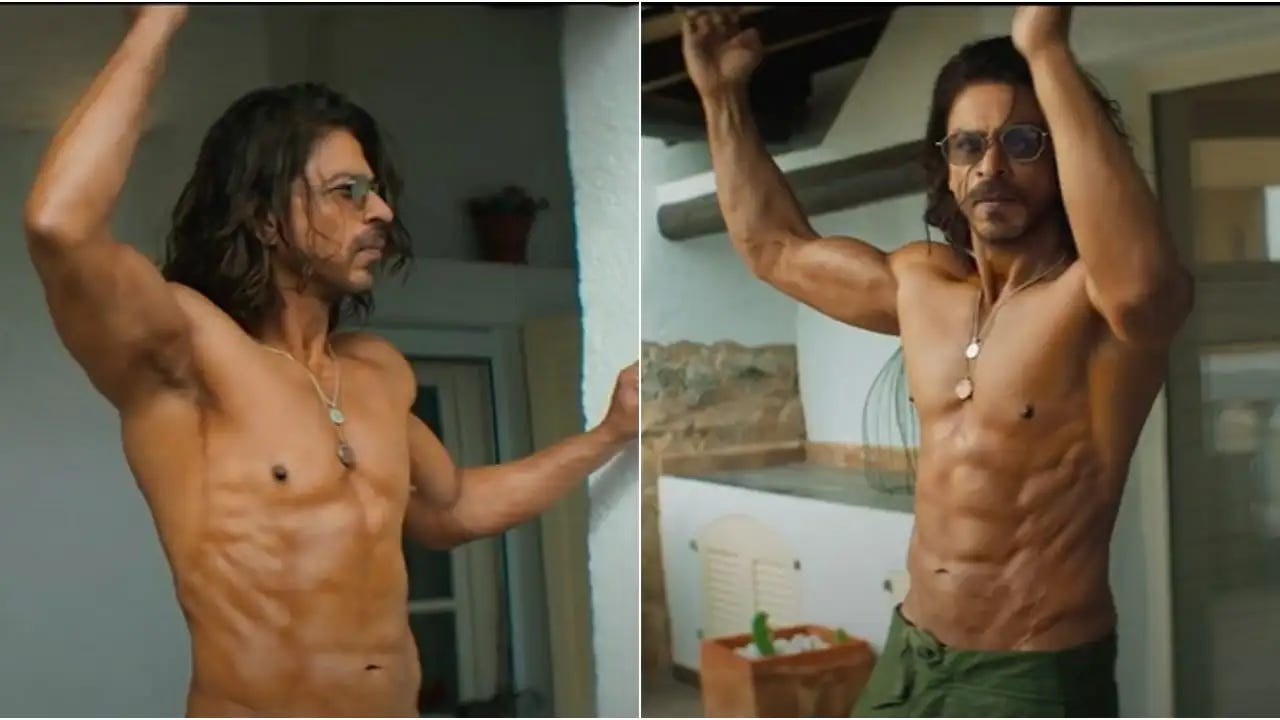Here in the States, it’s long been tossed around by big names in Hollywood that the concept of the “movie star” is effectively dead. From Anthony Mackie to Jennifer Aniston—even Quentin Tarantino—famous figures in our film industry have repeatedly made the argument that people no longer show up to movies specifically for a name on a poster, at least not like they used to.
Sure, we still have Tom Cruise, who strongarms box office hits into existence with a potent combination of leading-man charisma, shrewd producer know-how, and a lunatic commitment to death-defying stunts. But in a box office landscape dominated by popular IP—like Marvel, DC, Star Wars, Jurassic Park— we don’t see as many blockbusters being built around a specific actor so much as a specific brand or property.
While there may be some validity to their claims, I think the truth is that Mackie, Aniston, and all the other crybabies are just mad that they aren’t Shah Rukh Khan.
If you’ve never heard that name, well, you’re probably not from the Eastern hemisphere. I won’t make this review a history lesson, but look him up— ”phenomenon” does not do him justice.
Nicknamed “SRK” by fans, he is often casually (some might say disrespectfully) referred to by Westerners as “India’s Tom Cruise,” but really, we should probably be calling Tom Cruise “America’s SRK.” Unlike Hollywood, India’s film industries are still chock-full of massive household-name stars that dominate the blockbuster space, and king of them all is SRK.
I mean, look at him.
C’maaahhhn.
At the age of 57, he’s been on top of the Bollywood market for 30-plus years. He already released one ludicrous action film this year, Pathaan (pictured above), and now he’s back at it again with a new one that’s longer, more dramatic, and somehow even more badass: Jawan.
Jawan (meaning “soldier”) follows Azad (SRK), the jailer of a women’s prison, and his team of six specialized inmates. Each of them was sentenced to prison for a violent crime of passion. But they all share a commonality: they were all cast aside, betrayed, or otherwise trampled on by the faulty, lazy bureaucracy of the Indian government, whose disregard for them is what precipitated their crimes.
This shared experience is what forged them into a team. Together, they execute Robin Hood-like acts of terrorism around the country, with the intent to force corrupt government officials into making changes to benefit the people.
In the film’s opening setpiece, Azad and his team stop a train, threatening to blow it up, along with several nearby hospitals and schools, unless 400 billion rupees (about $4.8 billion) are handed over by the government.
Azad takes full advantage of the stage he’s cleared for himself to ham it up with the theatrics, and SRK gets plenty of real estate to play with. Disguised in rags, torn clothes, and bandages fit for a dying homeless person, and adorned with a bald cap, Azad dances up and down the train cars, menacing the passengers and laughing maniacally about killing children. (Worth noting that I was a few minutes late to my showing. I walked in in the midst of this sequence, and I genuinely thought for a minute that SRK might be playing the villain—he’s pretty diabolical here.)
But it’s all just scare tactics aimed at the government on behalf of the lower class. The government calls in wealthy arms dealer Kaalie Gaikwad (Vijay Sethupathi) to complete the payment in their stead, and over the radio, Azad leaves Kaalie with an ominous name-drop: Vikram Rathore.
Powerless to stop them is National Security Guard officer Narmada Rai (Nayanthara), who burns at the thought of being outfoxed by such a small group.
Things get more complicated for Narmada and Azad when they meet outside of work and subsequently fall in love. Azad knows who she is, but Narmada doesn’t recognize Azad due to the disguises he wears during his team’s missions. Azad yearns to tell her the truth, but this is an action thriller, so we know it won’t be that easy.
It’s funny how little development Azad and Narmada’s relationship gets, and yet it’s still incredibly rootable, thanks mostly to Khan’s and Nayanthara’s pure charisma. A few beautiful dance and romance sequences, deftly constructed by director Atlee and crew, also help to sell the beauty of their love, even in the absence of fine details about what they see in one another. It’s the kind of thing I might knock a Hollywood film for lacking, but then again, a Hollywood film wouldn’t bring all the theatrical pomp to every single moment of their relationship that Atlee does. There’s an inherent power to the overt formalism common in Indian cinema that often affords a movie some wiggle room with a lean script.
Speaking of formalism, Jawan is packed to the brim with gorgeous, over-the-top action sequences. I don’t know enough about Khan’s behind-the-scenes practices to say how much of the action he actually does himself; in this film, it looks like a lot—and that’s especially notable given how much obvious digital face replacement there was in Pathaan. Here, despite Atlee’s gleeful disregard for physics and heavy use of special effects (not complaining), most of the violence feels very tangible and brutal. A lot of that credit should go to Khan, the stunt crew, and the other actors for their raw and expressive physicality.
Fans of last year’s RRR will find plenty of kinetic, bombastic violence to feast their eyes on. There’s also a really great car chase down a highway that feels like everything the Fast & Furious films would like to be, but largely lack the conviction from cast and crew to execute to the degree Jawan does. There are too many jaw-dropping fight scenes to list, all of them bursting with bone-crunching combat and hilariously inventive improvised weapons.
Back to that ominous name-drop: Vikram Rathore. About halfway through the film (maybe sooner), Azad finds himself overwhelmed with baddies. At his lowest moment of defeat, a hero swoops in—Vikram—putting a familiar face to the enigmatic name. I won’t spoil the details of who exactly Vikram is; that info is out in the press, but the film’s own trailers don’t spoil it, so neither will I. But henceforth, we’re treated to double the action as Vikram and Azad buddy up, as they both have a score to settle with Kaalie and the government officials he has in his backpocket. It’s quite the spectacle to behold.
Jawan is… kind of a lot, especially to Western eyes. It’s two hours and 45 minutes of action, flashbacks, and emotional roller-coastering. Those who saw RRR or are otherwise familiar with Indian cinema will be more than prepared, but if this is your first foray into that realm, just brace for a long, topsy-turvy adventure. There are some beats that don’t land with all the emotional impact that was obviously intended—I blame it on a cast of characters that’s a little too big and broad—and I found myself starting to foot-tap amidst the slew of reveals and flashbacks throughout the second act, but Atlee has a strong handle on momentum and ensures every scene, no matter how mundane, feels exciting and important.
It’s a lot, but it’s a lot of good shit. What really makes the whole thing is that, amidst the abundance of exciting action, Khan also gets a ton of room to play around as an actor. Azad takes on multiple forms, due to his need to disguise himself on missions, and each one feels like it could be a different character. That range is amplified further once Azad also has Vikram to play off of.
Jawan can be a somewhat exhausting experience, its cavalcade of explosions and incapacitations rolling over you like a bulldozer with a jet engine, and its flashback extravaganza throwing one speed bump after another into the A-plot. But it’s an exhaustion worth earning to be bathed in the warm and beautiful rays of Shah Rukh Khan.
Now I need to go watch all his other stuff, and so do you.






